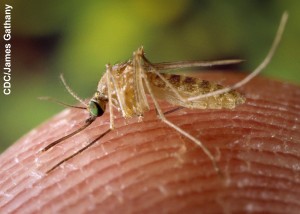Frequently Asked Questions About Mosquitoes

- Why are mosquito populations higher some years compared to others?
Mosquito populations fluctuate depending mostly on rainfall. Frequent rainstorms create more standing water and therefore, more floodwater nuisance mosquitoes.
- How much will it cost to call Bay County Mosquito Control for service?
If you have a mosquito problem, please call the office. There is no fee for service. Bay County residents, however, pay taxes that provide the funds (.55 mills) for program operation.
- What is the most effective protection against biting insects?
The most effective treatment is a repellent containing DEET, but there are other repellents available.
- Are mosquitoes active in inclement weather?
Mosquitoes are not active on windy or cool days. Fogging to control adult mosquitoes, therefore, only occurs when weather conditions are right.
- How does the Bay County Mosquito Control program control larval and adult mosquitoes?
Control products are used to treat water in ponds, storm drains, ditches, etc., where mosquito larvae are found or may develop later. Ultra Low Volume (ULV) sprays are used at critical times and locations to help control adult mosquitoes.
- Why are mosquitoes controlled in the larval stage?
The most effective and economical way to control mosquitoes is to prevent them from emerging as biting adults.
- Where do mosquitoes living in cities and towns come from?
Many are produced in water-filled containers like old tires, improperly maintained swimming pools, and street catch basins, where mosquito eggs are laid.
- What can homeowners do around their own backyards to reduce mosquitoes?
Homeowners can eliminate mosquito breeding sites on their property by periodically emptying water from containers such as bird baths, buckets, tires, gutters, etc.
- How will the insecticides used at Bay County Mosquito Control affect me and my family?
At the rates products are applied (1-2 ounces per acre, the lowest rates allowed by the label) and using Ultra Low Volume (ULV) equipment that produces very fine droplets to target mosquitoes, products should not pose a significant risk to you or your family as determined by the EPA after rigorous research. These materials have been used extensively and successfully throughout the country and locally for decades. For more information on insecticides and health, consult the Environmental Protection Agency, which oversees the registration of these insecticides. For information on when your neighborhood was last treated, see our Treatment Update page.
- Will the adult mosquito treatment affect my swimming pool water, lawn furniture, play equipment, toys, etc.?
Swimming pool water and items found in your yard should not be affected as the product is calibrated to come out in fine droplets that quickly degrade. Applications are made in the late evening hours and the materials we use break down rapidly in sunlight. It is not necessary to wash down furniture and other items that may have been exposed to the spraying materials
- How can I find out if fogging is taking place in my area?
Visit our When Does My Neighborhood Get Treated page to see tonight's treatment plan. To see when your area was last treated, check out our Adult Control Treatment Map.
- What is a mosquito habitat?
Mosquito habitats are places where mosquito eggs are laid, hatch, and larvae grow into adults. Any place that holds water for 7-10 days can be a mosquito habitat. To see examples, visit our Mosquito Habitat page to learn about and see pictures of actual habitats present in Bay County.
- How many species of mosquitoes are in the world and in Michigan?
There are about 2,500 species of mosquitoes worldwide, about 60 species in Michigan, and about 30 commonly found in Bay County.
- How long to mosquitoes live?
Depending on the species, mosquitoes can live several weeks to a month or more. Females live longer than males.
- How much blood does a female mosquito drink per serving?
About 5 millionths of a quart (for an Aedes aegypti)
- Why do we itch after a mosquito bites?
The itching we feel from a mosquito bite is our body's reaction to the anticoagulant injected with the female mosquito's saliva as she takes blood.
- What attracts a female mosquito to a human?
Carbon dioxide (CO2), our breath, is a proven attractant. Warm bodies, dark-colored clothing, and scents like perfume and deodorant also attract female mosquitoes.
- What do male mosquitoes do?
Male mosquitoes fertilize the females. They also feed on nectar and can therefore be pollinators. Male mosquitoes, which usually emerge shortly before females, form a mating swarm when females emerge. Females mate only once and store sperm that will later fertilize the eggs she lays.